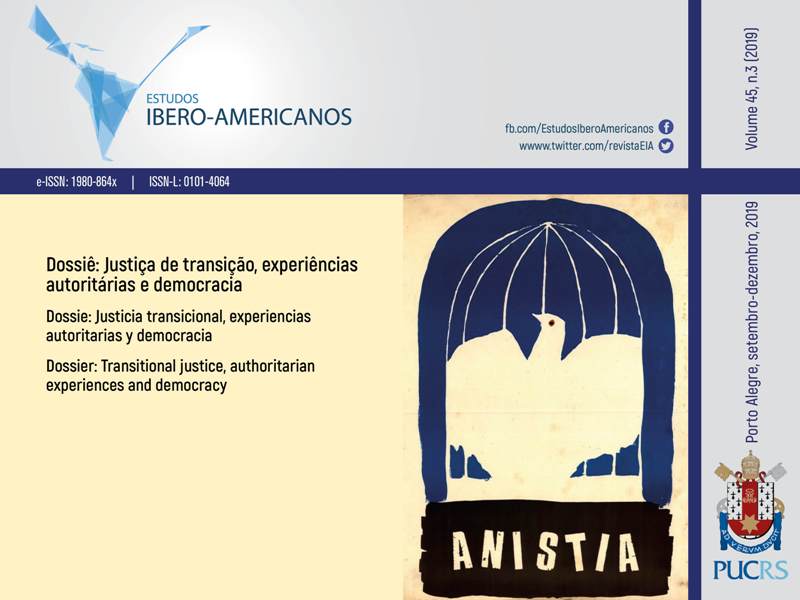Popular movements and its political outcomes in the Southern Cone during the 1970s: the Frente Amplio’s Base Committees in Uruguay and the Committees of the Chilean Unidad Popular in a comparative perspective
DOI:
https://doi.org/10.15448/1980-864X.2019.3.32299Keywords:
Unidad Popular. Frente Amplio. Political participation. Chile. Uruguay.Abstract
In this article, I propose a comparison between the experiences of the Frente Amplio’s Base Committees in Uruguay and the Committees of Chilean Unidad Popular in the early 1970s. Both the FA and the UP constituted mass movements, that used a strategy of political mobilization through committees which had a broad popular basis. Since they were multiparty alliances, the committees of the Frente Amplio and of the Unidad Popular were frequented by militants and sympathizers of different forces, which sometimes caused friction and controversy. To carry out this comparison, I analyzed internal documentation of the political movements and press releases on them, as well as interviews with some of their former members. I could identify some polemics about these organizations real importance and its place in the party’s structure, revealing different positions within the left-wing forces in Uruguay and Chile.
Downloads
References
AGGIO, Alberto. Democracia e socialismo: a experiência chilena. São Paulo: Annablume, 2002.
AGUIRRE BAYLEY, Miguel. Frente amplio, “la admirable alarma de 1971”: historia y documentos. Montevideo: Ediciones Cauce, 2005.
ALTAMIRANO, Carlos. Dialética de uma derrota: Chile 1970-1973. São Paulo: Brasiliense, 1979.
ÁLVAREZ VALLEJOS, Rolando. La unidad popular y las elecciones presidenciales de 1970 en Chile: la batalla electoral como vía revolucionaria. OSAL, Buenos Aires, v. 11, n. 28, p. 219-239, nov. 2010.
BORGES, Elisa de Campos. “¡Con la unidad popular ahora somos gobierno!” A experiencia dos cordones industriales no Chile de Allende. Rio de Janeiro: Multifoco, 2015.
CAETANO, Gerardo; PÉREZ, Romeo; RILLA, José. La partidocracia uruguaya: historia y teoría de la centralidad de los partidos políticos. Cuadernos del CLAEH, Montevideo, n. 44, p. 43-61, 1987-4.
CHASQUETTI, Daniel; BUQUET, Daniel. La democracia en Uruguay: una partidocracia de consenso. Política, Santiago, n. 42, p. 221-247, 2004. Disponível em: http://www.redalyc.org/pdf/645/64504211.pdf. Acesso em: 25 set. 2017.
COSTA, Janaína Alexandra Capistrano. O mito da racionalidade institucional e a construção da democracia no processo de emergência e consolidação do Estado chileno. Em Tempo de Histórias, Brasília, n. 11, p. 106-126, 2007. Disponível em: http://periodicos.unb.br/index.php/emtempos/article/view/20074. Acesso em: 25 set. 2017.
DEMASI, Carlos. La partidocracia uruguaya: aportes para la discusión de una hipótesis. Contemporánea, Montevideo, año 3,v. 3, p. 267-282, 2012. Disponível em: http://www.geipar.udelar.edu.uy/wp-content/uploads/2014/10/Contemporanea03_2012-11-23-webO-14.pdf. Acesso em: 25 set. 2017.
DRAKE, Paul. Chile, 1930-1958. In: BETHELL, Leslie (org.). História de América Latina. São Paulo: EDUSP, 2015. (A América Latina após 1930: México, América Central, Caribe e Repúblicas Andinas, v. IX). p. 805-851.
DUVERGER, Maurice. Os partidos políticos. Rio de Janeiro: Zahar, 1980.
FARÍAS, Víctor. La izquierda chilena 1969-1973. Santiago de Chile: Centro de Estudios Públicos, 2000. Documentos para el estudio de su línea estratégica. Disponível em: https://
www.cepchile.cl/la-izquierda-chilena-1969-1973/cep/2016-03-
/185716.html. Acesso em: 29 abr. 2019.
FERREIRA, André Lopes. Mobilização e participação política no Uruguai dos anos 1970: a experiência dos Comitês de Base da Frente Ampla. Dimensões, Vitória, v. 29, p. 50-69, 2012. Disponível em: http://www.periodicos.ufes.br/dimensoes/article/view/5399/3987. Acesso em: 18 abr. 2019.
HARNECKER, Marta. Forjando la esperanza. Santiago de Chile: LOM Ediciones, 1995.
NAHUM, Benjamín. El fin del Uruguay liberal. Montevideo: EBO, 1998. (Historia Uruguaya, t. 8, libro 10).
RAMA, Germán. El club político. Montevideo: ARCA, 1971.
ROSARIO BEISSO, María del; CASTAGNOLA, José Luis. Identidades sociales y cultura política en Uruguay: discusión de una hipótesis. Cuadernos del CLAEH, Montevideo, v. 12, n. 44, p. 9-18, 1987.
ROUQUIÉ, Alain. O Estado militar na América Latina. São Paulo: Alfa-Ômega, 1984.
SCULLY, Timothy. La Reconstitución de la política de partidos en Chile. In: MAINWARING, Scott; SCULLY, Thimothy (ed.). La construcción de instituciones democráticas: sistema de partidos en América Latina. Santiago de Chile: CIEPLAN, 1996. p. 83-112.
SOUZA, Ana Cristina Augusto. Salvador Allende e o mito da estabilidade chilena. Intellector, Rio de Janeiro, ano 3, v. 3, n. 6, jan./jun. 2007. Disponível em: http://www.revistaintellector.cenegri.org.br/ed2007-06/anacristina-2007.pdf. Acesso em: 25 set. 2017.
TAPIA VIDELA, Jorge. El difícil camino de transición al socialismo: el caso chileno, en una perspectiva histórica. In: GIL, Federico; LAGOS, Ricardo; LANDSBERGER, Henry (dir.). Chile 1970-1973: lecciones de una experiencia. Madrid: Editorial Tecnos, 1977. p. 33- 87.
WINN, Peter. A revolução chilena. São Paulo: UNESP, 2010.
Downloads
Published
How to Cite
Issue
Section
License
Copyright (c) 2019 André Lopes Ferreira

This work is licensed under a Creative Commons Attribution 4.0 International License.
Copyright
The submission of originals to Estudos Ibero-Americanos implies the transfer by the authors of the right for publication. Authors retain copyright and grant the journal right of first publication. If the authors wish to include the same data into another publication, they must cite Estudos Ibero-Americanos as the site of original publication.
Creative Commons License
Except where otherwise specified, material published in this journal is licensed under a Creative Commons Attribution 4.0 International license, which allows unrestricted use, distribution and reproduction in any medium, provided the original publication is correctly cited.






